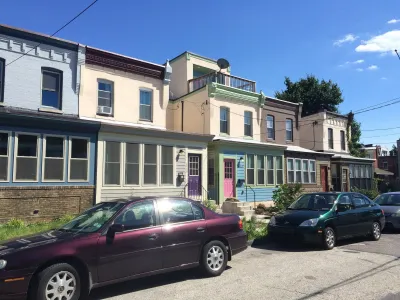Minneapolis is setting a bold example by ending single-family zoning, but chances are a similar change won’t be coming to Philadelphia.

Minneapolis recently approved a plan to eliminate single-family zoning in a move to address housing affordability and a legacy of racial segregation. Jake Blumgart says such a zoning change is not politically realistic in Philadelphia, where city council members are much less inclined to support such a measure. In fact, they have not supported upzoning efforts or a plan to add accessory dwelling units to the city’s zoning code.
Still, Blumgart says considering what is happening in Minneapolis and differences between the two cities can be useful. For one, Philadelphia does not appear to be facing an affordable housing crisis like Minneapolis, and the city's row houses and smaller lot sizes mean more density. Philadelphia also has a higher rental vacancy rate and a lower median home sale price.
Philadelphia’s housing challenges are less about availability and more about providing resources to low-income residents, says Blumgart:
The principal housing issue facing Philadelphia is that most low-income residents live without subsidies and can barely afford their rent. No matter how many units are built, the price reductions that stem from greater supply are not large enough to help the poorest.
He also notes that homeownership rates are higher in Philadelphia than in Minneapolis and similar racial segregation patterns have not emerged across the city.
In addition, Blumgart points out that Philadelphia is a Democratic city, but it is not as politically progressive as Minneapolis. "Minneapolis’s radical zoning overhaul is the fruit of a sweeping turnover on its city council and a willingness to try new strategies in the face of an incipient housing crisis."
What is the overall takeaway for Philadelphia? "Experts say that policymakers don't have to necessarily export the Minneapolis plan but should instead analyze where market demand is hottest and where it is likely to move next, and zone accordingly," says Blumgart.
FULL STORY: 3 reasons why Philadelphia won’t follow Minneapolis’s ban on single-family zoning

Analysis: Cybertruck Fatality Rate Far Exceeds That of Ford Pinto
The Tesla Cybertruck was recalled seven times last year.

National Parks Layoffs Will Cause Communities to Lose Billions
Thousands of essential park workers were laid off this week, just before the busy spring break season.

Retro-silient?: America’s First “Eco-burb,” The Woodlands Turns 50
A master-planned community north of Houston offers lessons on green infrastructure and resilient design, but falls short of its founder’s lofty affordability and walkability goals.

Test News Post 1
This is a summary

Analysis: Cybertruck Fatality Rate Far Exceeds That of Ford Pinto
The Tesla Cybertruck was recalled seven times last year.

Test News Headline 46
Test for the image on the front page.
Urban Design for Planners 1: Software Tools
This six-course series explores essential urban design concepts using open source software and equips planners with the tools they need to participate fully in the urban design process.
Planning for Universal Design
Learn the tools for implementing Universal Design in planning regulations.
EMC Planning Group, Inc.
Planetizen
Planetizen
Mpact (formerly Rail~Volution)
Great Falls Development Authority, Inc.
HUDs Office of Policy Development and Research
NYU Wagner Graduate School of Public Service




























